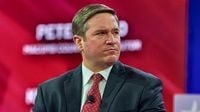On August 19, 2025, the Trump administration took the unusual step of appointing Missouri Attorney General Andrew Bailey as co-deputy director of the FBI, placing him alongside current deputy director Dan Bongino. The announcement, first reported by Fox News Digital and confirmed by both Attorney General Pam Bondi and FBI Director Kash Patel, has left many in Washington and within the bureau itself scratching their heads. The move, described by The New York Times as "bewildering" to many current and former FBI agents, marks a dramatic departure from the agency’s traditional leadership structure, which typically features a single deputy director overseeing daily operations.
Attorney General Pam Bondi was effusive in her praise for Bailey, telling Fox News, “I am thrilled to welcome Andrew Bailey as co–deputy director of the FBI. He has served as a distinguished state attorney general and is a decorated war veteran, bringing expertise and dedication to service. His leadership and commitment to the country will be a tremendous asset as we work together to advance President Trump’s mission.” FBI Director Kash Patel echoed these sentiments, emphasizing that the bureau “will always bring the greatest talent this country has to offer in order to accomplish the goals set forth when an overwhelming majority of American people elected President Donald J. Trump again.”
Bailey, for his part, expressed gratitude to his home state on social media as he announced his resignation as Missouri Attorney General. “My tenure as Attorney General has been the honor of my professional career, but what has made it truly meaningful has been the opportunity to serve my home state,” he wrote. In a separate statement, Bailey thanked the Trump administration for “the privilege to join in their stated mission to Make America Safe Again.”
Dan Bongino, the former Secret Service agent and right-wing podcast host who has served as the FBI’s sole deputy director since March 2025, responded to the news of Bailey’s appointment with a terse social media post: “Welcome,” accompanied by three American flag emojis. It's a notably restrained reaction, especially given recent turbulence within the bureau’s upper ranks.
The specifics of how Bongino and Bailey will divide their responsibilities remain unclear. Traditionally, the deputy director of the FBI manages the bureau’s day-to-day operations. Now, with two people sharing the title, many are left wondering how duties will be allocated—or whether the arrangement is sustainable in the long term. According to CNN, the appointment follows a period of reported discontent for Bongino, who earlier this year considered leaving the bureau altogether. His frustration reportedly stemmed from disagreements with Bondi over the handling of the Jeffrey Epstein files, an episode that saw Bongino fail to report to work at one point in June 2025. Despite rumors of his impending departure, Bongino ultimately stayed, with President Trump reportedly maintaining confidence in him, according to CBS News.
White House spokesperson Harrison Fields sought to downplay the drama last month, stating, “Any attempt to sow division within this team is baseless and distracts from the real progress being made in restoring public safety and pursuing justice for all.” Still, the optics of the co-deputy director arrangement have fueled speculation about the administration’s motives. As The New York Times observed, President Trump has a history of appointing multiple people to high-level positions, sometimes even assigning the same role to more than one individual. The move could be interpreted as an effort to maximize chaos—or, perhaps, as a way to ease the burden on Bongino, who admitted in a May 2025 Fox News appearance that the job was taking a toll on him. “I gave up everything for this,” Bongino confessed. “I stare at these four walls all day in D.C., by myself, divorced from my wife—not divorced, but I mean separated, divorced—and it’s hard. I mean, we love each other, and it’s hard to be apart.” He added, “People ask me all the time, ‘Do you like it?’ I say, ‘No, I don’t.’”
Bailey’s own record suggests his appointment is anything but apolitical. Known for his aggressive, partisan approach as Missouri’s top law enforcement officer, Bailey gained national attention in 2024 when he petitioned the U.S. Supreme Court to block sentencing during New York’s criminal case against then-President Trump. The Supreme Court ultimately rejected the effort, but the move cemented Bailey’s reputation as a staunch Trump ally. According to The New York Times, Bailey has also called for criminal prosecution of President Joe Biden over the administration’s student loan debt forgiveness program, launched investigations into Google for allegedly suppressing conservative viewpoints, and probed AI chatbots for perceived anti-Trump bias. His office even fought to keep exonerated prisoners behind bars and promoted controversial policies to advance an anti-abortion agenda.
Critics argue that Bailey’s appointment is emblematic of the ongoing politicization of the FBI under Director Kash Patel. The bureau has faced a series of internal challenges in recent years, including allegations of abuse, mismanagement, and politically motivated purges. Some observers worry that adding a hyperpartisan figure like Bailey to the leadership team may further undermine morale and independence at the nation’s top law enforcement agency. As The New York Times put it, “With Bailey joining the bureau’s leadership team, it’s likely to get worse.”
Yet supporters of the administration see the move differently. Bondi and Patel’s statements frame Bailey’s appointment as a strategic addition, bringing fresh energy and a proven commitment to the Trump agenda. They argue that Bailey’s experience as a state attorney general and his military background make him uniquely qualified to help steer the FBI through a period of significant transition and public scrutiny.
For now, the practical implications of the co-deputy director arrangement remain to be seen. Will Bailey and Bongino find a way to collaborate effectively, or will the unusual structure exacerbate existing tensions within the bureau? And what does this signal about the Trump administration’s broader approach to federal law enforcement? One thing’s for certain: with Bailey’s appointment, the Trump White House has once again demonstrated its willingness to break with precedent—and stir up controversy—in pursuit of its goals.
As the dust settles, the FBI’s rank and file, as well as the American public, will be watching closely to see how this latest experiment in leadership unfolds.


